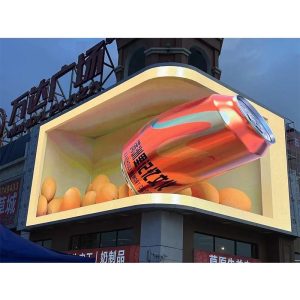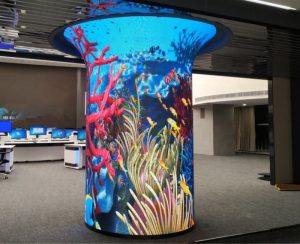The era of small spacing is not well understood by many people, but it is a new concept that has emerged in the technological development of the LED display screen industry. With the development of LED display screen technology, the emergence of the “small pitch era” of LED display screens has solved many bottleneck problems in the development of industries.
P1.25 LED small pitch display products have high prices and large profits, and the low gross profit problem that troubles the industry is easily solved; Small spacing can be combined with concepts such as touch, naked eye 3D, intelligent applications, and cloud playback control to overcome the severe homogenization of industry products; Trapped by industry attributes, the LED display screen market is narrow, and enterprise scale cannot grow. However, small spacing not only expands the application fields of LED displays, but also has the hope of entering the civilian market. Another thing is that LED companies, which have been following behind foreign giants, finally stand tall and take the lead in their foreign counterparts at a small distance.
With the continuous improvement of the overall level of micro assembly technology in China, the pixel center to center distance of high-density indoor display screens continues to make breakthroughs, and the pixel center to center distance of indoor LED screens has entered the era of 1xmm.
In terms of outdoor applications, the improvement of surface mounted LED packaging technology and the improvement of outdoor module protection level have broken the shackles of 10mm pixel center distance in outdoor full-color LED display screens. The limit value of pixel center distance is constantly being refreshed, and outdoor full-color large screens with a pixel center distance of 5.xmm have been applied in the market.
As LED display screens enter the “small era”, new trends have also emerged in industrial development.
1. Small pitch LED display screens will become the mainstream application in the indoor and outdoor markets. Small pitch LED display screens refer to LED display screens with a pitch of less than p2.5. They use pixel level point control technology to achieve the restoration and uniformity of brightness and color of display screen pixel units.
Since 2010, the competition for conventional LED displays has been particularly fierce, and price wars have almost encroached on the basic profits of enterprises. As a result, various emerging markets have developed rapidly, with outstanding performance in outdoor media, industry, outdoor surface stickers, and special-shaped screens. Among them, high-density small pitch LED displays have become the most popular products in the industry.
At present, the profit margin of small pitch LED displays is relatively abundant, and they also have great development potential in high-end fields such as monitoring, command, scheduling, and conferences, with good future prospects.
2. How to reduce the current density is the key to the success or failure of LED displays in the lighting field. In order to obtain high brightness lighting products, terminal application manufacturers generally choose to use “high current density chips”.
However, as LED display applications enter the era of small spacing, the appropriate LED current density is exactly the opposite. This is mainly because in terms of display screen applications, the quality of the product is not better than whose screen is made brighter, but whose screen is made darker, so dark that it will not cause irritation to the human eye in dim environments




